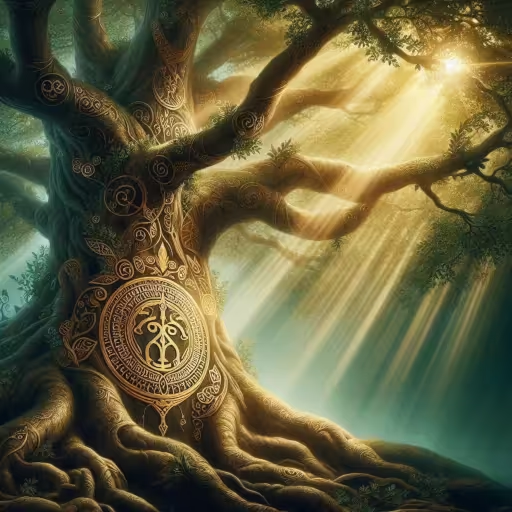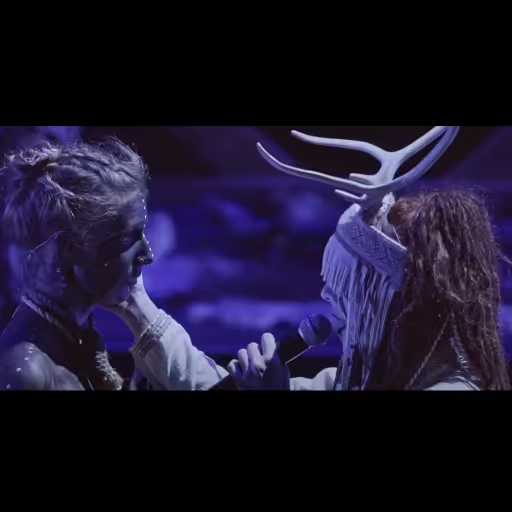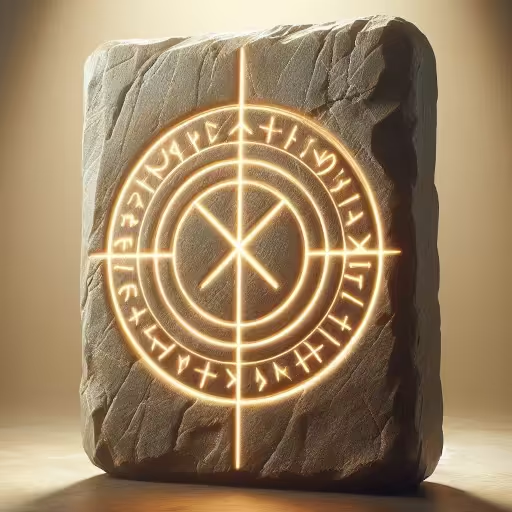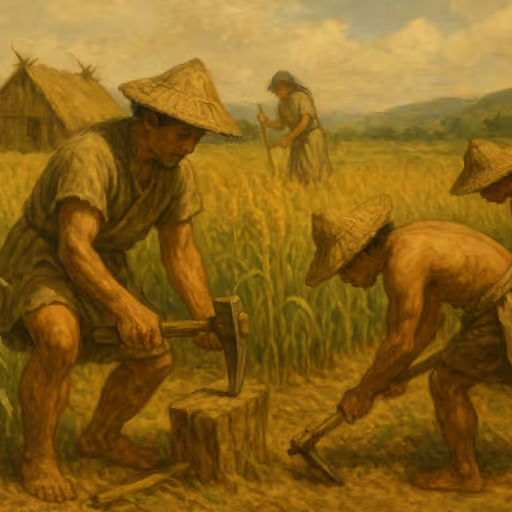Heilung - Asja Lyrics and Meaning
The song "Asja" (ᚪᛋᚽᚪ) by Heilung draws from Proto-Germanic, Old Norse, and reconstructed ancient European languages. Much of Heilung's work is rooted in pre-Christian, Northern European spiritual practices, often invoking deities, nature spirits, and ancestral protection through sound rituals. "Asja" itself resembles Proto-Germanic or early Norse terms related to protection, divine guardianship, and spiritual power.
The song serves as an enchantment or invocation, blending archaic words, reconstructed chants, and phonetic expressions to evoke a trance-like state. The repetitive structure, abstract syllables, and references to deities or spiritual concepts are designed to invoke protection, connection to higher realms, and inner stability—key elements of ancient ritual songcraft.
🔎 Linguistic Roots & Possible Meaning of "Asja"
The word Asja (ᚪᛋᚽᚪ) in this ritual context draws heavily from Proto-Germanic, Old Norse, and mythic linguistic reconstruction, blending both phonetic invocation and ancestral symbolism.
Etymological Possibilities:
- Old Norse áss → Singular of Æsir, the gods (e.g., Odin, Thor).
- Proto-Germanic ansuz → Root for áss, meaning divine being or ancestral spirit.
- Ansuz Rune (ᚨ) → Symbol of communication, divine power, and spiritual authority.
- Old English ōs (pl. ēse) → Cognate for godlike or divine presence; preserved in names like Oswald ("divine rule").
- Old High German ans / ensî → Referring to ancestral gods or spirits in continental West Germanic traditions.
- Ásynja / Ásynjur\ → Feminine form for Norse goddesses like Frigg or Freyja, possibly influencing the feminized Asja*.
Additionally, the rune-like spelling of Asja includes:
- ᚽ (Eihwaz rune-like character) → Traditionally associated with the yew tree, endurance, protection, and connection between worlds.
Thus, Asja functions as a:
✅ Protective utterance evoking divine presence
✅ Hybrid linguistic charm fusing historic roots with mythic soundscape
✅ Feminine-coded invocation, possibly tied to Ásynjur, the goddesses
The form isn't a strict historical word but follows Heilung's tradition of reconstructed ritual language designed for ancestral evocation, protection, and spiritual resonance.
📜 Cultural and Symbolic Context
Given Heilung's body of work and their stated use of:
- reconstructed languages
- ritual soundscapes
- spiritual invocations of ancestral power
…it's very likely Asja is meant to invoke a divine presence—not unlike calling upon the Æsir themselves (or their feminine counterparts, Ásynjur), possibly through:
- A re-spelled or phonetic representation of "áss" (ᚪᛋ)
- A feminized or ceremonial variation, similar to Ásynja
- A nod to the Ansuz rune (ᚨ), representing inspiration, divine breath, or ancestral voice
However, the ᚽ (Eihwaz rune-like symbol) in the middle of Asja complicates strict translation. Eihwaz symbolizes yew trees, endurance, and protection, which supports the "protection" theme, but isn't strictly part of "áss" or "ásynja" etymology.
Literal Line-by-Line Breakdown with Translation
Here's a concise, usable breakdown of Heilung's "Asja (ᚪᛋᚽᚪ)" with language background, intended meaning, enchantment purpose, and a literal line-by-line translation formatted cleanly for use in MP3 tags:
**Verse 1 (Intro):**
Gá is nurna gangan yng yng pjarx
(*Heed the Norn's journey, Yngvi Yngvi, fire*)
_Note: 'Nurna' evokes 'Norn' (fate-weaver); 'pjarx' is phonetic, meaning speculative_
Hang hang gang gang
(*Hang hang go go*)
Hymir ganda skadla hym hym gan
(*Hymir's spirit-staff, shadowed one, hym hym go*)
_'Ganda' = magical staff/spirit; 'Skadla' likely from 'skaði' (shadow/harm)_
Fold fold Har har
(*Earth Earth, High High*)
_'Fold' = land/earth; 'Har' = "High One" (Odin epithet)_
Ou mi galdr maðr áss áss æt
(*Hear my spell, man of the Æsir, Æsir kin*)
Óm óm gal gal
(*Resound resound, spell spell*)
Futhork haniast bjamlyr futh futhork
(*Futhark... [haniast, bjamlyr]... Futhark*)
_Note: 'Haniast' and 'bjamlyr' are likely ritual or invented terms—phonetic emphasis only_
Futh futh bjam bjam
(*Strength strength, echo echo*)
Hyndla horskr móðr má má kat
(*Hyndla wise, wrathful, má má kat*)
_'Hyndla' is a Norse seeress figure; 'móðr' = wrath/spirit_
Hap hap tak tak
(*Luck luck, grasp grasp*)
---
**Chorus (Repeats):**
Ásjá, angan, bjarga
(*Asja, essence, protect*)
_'Angan' literally "pleasant scent" in Icelandic, metaphorically spirit/essence_
_'Bjarga' = to protect or save_
Ást standa ok fár hverfra
(*Love stands, few vanish*)
Ásjá, angan, næ næ næ
(*Asja, spirit, near near near*)
Ok þú e er truir truir truir
(*And you are true, true, true*)
---
Ásjá, angan, bjarga
(*Asja, essence, protect*)
Ást standa ok fár hverfra
(*Love stands, few vanish*)
Ásjá, angan, tjá tjá tjá
(*Asja, spirit, speak speak speak*)
Ok þú e er ár ár ár
(*And you are prosperous, prosperous, prosperous*)
_'Ár' = Old Norse for prosperity, good fortune_
---
Ásjá, angan, bjarga
(*Asja, spirit, protect*)
Ást standa ok fár hverfra
(*Love stands, few vanish*)
Kann ek galdr at gala
(*I know the spell to sing*)
Ønd og heill sjá er kan
(*Spirit and luck, see what I know*)
_'Ønd' = spirit/breath; 'heill' = luck, wholeness_
---
Ásjá, angan, bjarga
(*Asja, essence, protect*)
Ást standa ok fár hverfra
(*Love stands, few vanish*)
Jafnan sæld órlausn
(*Always satisfaction, release*)
_'Sæld' = happiness/satisfaction; 'órlausn' = release/liberation_
Friðr, maðr, opt opt opt
(*Peace, man, often often often*)
---
**Verse 2 (Outro):**
Gá is nurna gangan yng yng pjarx
(*Heed the Norn's journey, Yngvi Yngvi, fire*)
Hang hang gang gang
(*Hang hang go go*)
Hymir ganda skadla hym hym gan
(*Hymir's spirit-staff, shadowed one, hym hym go*)
Fold fold Har har
(*Earth Earth, High High*)
Ou mi galdr maðr áss áss æt
(*Hear my spell, man of the Æsir, Æsir kin*)
Óm óm gal gal
(*Resound resound, spell spell*)
Futhork haniast bjamlyr futh futhork
(*Futhark... haniast, bjamlyr... Futhark*)
Futh futh bjam bjam
(*Strength strength, echo echo*)
Hyndla horskr móðr má má kat
(*Hyndla wise, wrathful, má má kat*)
Hap hap tak tak
(*Luck luck, grasp grasp*)NOTE: Some phrases use reconstructed or symbolic words with no direct modern equivalent; where exact translations aren't possible, we note the intention or likely meaning.
Symbolic Themes & Ritual Functions
Many of the song's expressions function like incantations, echoing the Northern European tradition of galdr—ritual song-spells. Words like galdr, áss, and friðr reference not just literal meanings, but evoke a spiritual intent:
- Asja — both a name and a sigil-like utterance likely meaning protection or presence.
- Galdr — ancient sung magic, carrying vibrations into both material and spiritual planes.
- Maðr, Æsir, Thor, Hyndla — personifications of divine archetypes.
- Fold and Har — grounding in the earth and sky, invoking balance.
The repetition of abstract syllables (hang hang, tjá tjá tjá, opt opt opt) functions similarly to mantras or drumming rhythms, pulling the listener into a meditative or ecstatic state.
Conclusion
Asja is not simply a song—it's a ritual enactment, or a bridge between linguistic archaeology and emotional invocation. Heilung's artistry lies in breathing sonic life into lost or half-imagined languages, letting them speak again through rhythm and resonance. The track invokes protection (bjarga), spiritual proximity (angan), divine love (ást), and internal clarity (ár), all while surrounding the listener in a hypnotic, sacred soundscape.
It stands as a testament to the potency of reconstructed language and ancient ritual in modern music, reviving the memory of ancestral voices and letting their echoes heal, guide, and awaken.
Sources
- Meaning of Asja (ᚪᛋᚽᚪ) by Heilung
- Æsir Wikipedia Article
- Elder Futhark Wikipedia Article
- 'maðr' Wiktionary Article
- 'galdr' Wiktionary Article
- 'fold' Wiktionary Article
- 'bjarga' Wiktionary Article
- 'anga' Icelandic Wiktionary
- 'frið' Wiktionary Article
- 'horskr' Wiktionary Article
- 'norn' Wiktionary Article
- Yngvi Wikipedia
- Reddit: Asja's lyrics in English
- Hávamál
- Elder Futhark
- Medieval Runes
- Ár Old Norse Dictionary
- 'móðr' Wiktionary Article













